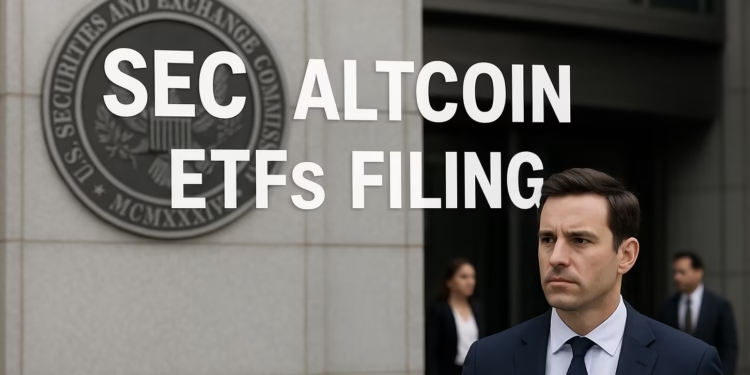Institutional investors may soon shift focus toward altcoins as a new series of altcoin ETF filings gain traction in the United States. According to analysts, the U.S. Securities and Exchange Commission (SEC) received at least five altcoin ETF filings during the first half of October 2025, marking the beginning of what could be the next wave of institutional cryptocurrency investment.
Despite a partial U.S. government shutdown slowing progress, market experts say approval of even one altcoin ETF filing could reshape capital allocation in the crypto sector.
“Altcoin ETF inflows are the inevitable next step after Bitcoin and Ethereum ETFs proved institutional demand,” Leon Waidmann, Head of Research at Web3 analytics firm Onchain, said. “This is regulatory confidence translating into capital flows.”
Waidmann added that each approved altcoin ETF filing “opens the door for the next wave of institutional buying,” following the success of Bitcoin and Ethereum exchange-traded funds earlier in the year.
Ether ETFs overtake Bitcoin inflows in third quarter
The latest market data suggests institutional investors are already diversifying. Spot Ether ETFs attracted $9.6 billion in inflows during Q3 2025, surpassing the $8.7 billion reported for spot Bitcoin ETFs, according to data aggregator SosoValue.
This reversal marks the first time Ethereum-based products have outperformed Bitcoin ETFs on a quarterly basis. Analysts see this as evidence that institutions are broadening their exposure beyond the two dominant digital assets.
“The shift indicates growing institutional demand for alternative crypto exposure,” said Waidmann. “Institutions found Bitcoin via ETFs, now they’re moving into Ethereum and other altcoins are coming next.”
The expanding altcoin ETF filing pipeline reflects this transition, with investors seeking regulated vehicles to gain exposure to DeFi and Web3 projects through traditional finance instruments.
Smart money positions for altcoin ETF approval
Blockchain intelligence platform Nansen reports that the most successful traders, known as “smart money” wallets, are already positioning themselves ahead of potential altcoin ETF filing approvals.
The data shows Uniswap (UNI), Aave (AAVE), and Chainlink (LINK) as the three most held tokens among institutional and sophisticated investors as of early October. Analysts believe these tokens could benefit the most from the initial wave of altcoin ETF filings due to their established liquidity and regulatory clarity.
Rivera noted that this structural shift could accelerate capital inflows across multiple blockchain ecosystems, transforming altcoins into mainstream investment products rather than speculative assets.
BlackRock’s absence raises questions about ETF inflow potential
Still, not all analysts are optimistic. The absence of major asset manager BlackRock from the initial altcoin ETF filings has raised concerns about the overall scale of institutional participation.
BlackRock’s Bitcoin ETF remains the only fund to post positive year-to-date inflows, with over $28.1 billion in investments accumulated in 2025. Without BlackRock’s influence, other Bitcoin ETFs have recorded a net outflow of $1.27 billion, according to Vetle Lunde, Head of Research at K33.
“Based on the dynamics seen in Bitcoin ETF investments, BlackRock’s absence from the altcoin ETF wave may limit cumulative inflows and their potential tailwind effect on underlying tokens,” — Lunde said in a recent report.
This hesitation could mean smaller funds and newer entrants lead the altcoin ETF filing landscape initially, limiting short-term market impact but potentially setting the stage for broader adoption once major players join.
A pivotal moment for regulated altcoin exposure
The surge in altcoin ETF filings underscores a new phase in crypto’s institutional evolution. With regulated pathways now extending beyond Bitcoin and Ethereum, the market is bracing for a diversified influx of capital targeting decentralized finance and Web3 ecosystems.
If approved, these altcoin ETF filings could provide institutional investors with the tools to engage with altcoins in a compliant, transparent, and scalable way potentially transforming how capital markets interact with the broader crypto industry.
As regulatory confidence deepens, and investor appetite expands, the altcoin ETF filing trend may well define the next frontier of institutional crypto participation as a bridge between traditional finance and the decentralized future.











